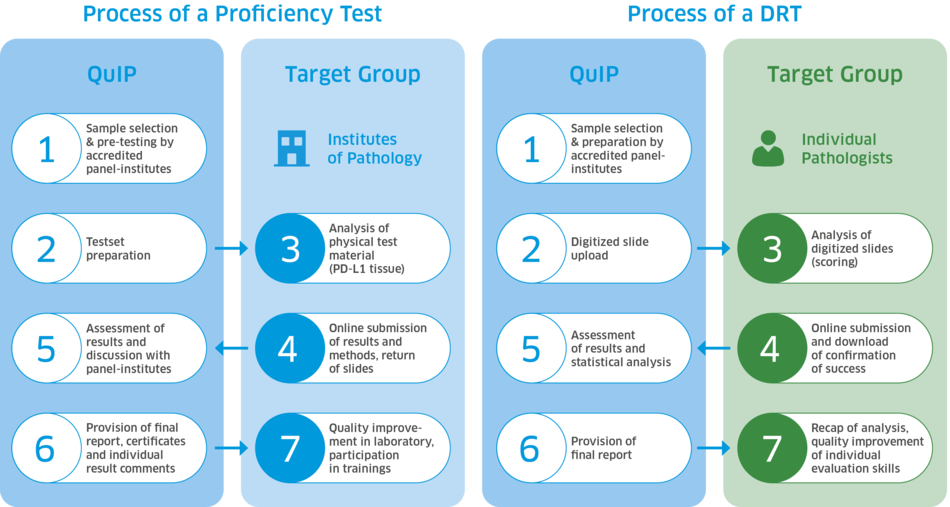Why Digital Readout Tests (DRT)?
On the importance of Digital Readout Tests for pathology
Synopsis of the processes of proficiency test and digital readout test

What are Digital Readout Tests?
In order to monitor and further develop the interpretation of histological staining, QuIP is working on the concept of online tests where participants are provided with a defined number of scanned sample preparations to interpret. These readout tests should give pathologists the opportunity to check their level of knowledge.
Digital Readout Tests (DRTs) are a supplement to the QuIP proficiency tests. The material to be assessed (e.g. immunohistochemical stainings, histological sections) is made available to the participants centrally and in digitized form on our website. The participants evaluate the material with regard to the given criteria, such as biomarker-dependent scores or entity-related categories.
The DRTs are aimed at pathologists, medical students or other interested professionals who would like to train and test their individual evaluation skills - quickly, flexibly and digitally. With the availability of training or practice cases, attached expert annotations and the potential provision of different staining protocols for the individual biomarkers, the DRTs represent an innovative and educationally beneficial format.
QuIP provides participants digitized samples for analysis. This enables individual pathologists to validate the quality of their evaluation of different biomarkers, independent of their institutes‘ methodical performance.
QuIP reports test results and provides a tool for individual benchmarking. After successful completion of a DRT, the participant receives a confirmation of success (certificate), which can be downloaded from the QuIP website.
What is the difference between Proficiency Tests and Digital Readout Tests?
The QuIP proficiency tests are used for the internal validation of the technical and associated diagnostic examination procedures. For this purpose, the technical preparation of the sample material and the related analysis and interpretation of the results are essential.
DRTs replicate the sub-process of results analysis and can provide a statement regarding the individual evaluation quality of the participants. Since only optimally stained material is provided as a starting point, quality-reducing laboratory performance problems that can occur in everyday diagnostic work are eliminated. In other words, DRTs test participants' evaluation skills under ideal conditions.
A certificate of successful participation here is always related to an individual, in contrast to the proficiency tests, which focus on the performance and proficiency of the participating institutes. The DRTs are thus a valuable supplement for the individual pathologist, but not a substitute for proficiency tests in the context of quality management in pathology.
You can download a factsheet about the difference between Proficiency Tests and Digital Readout Tests here.